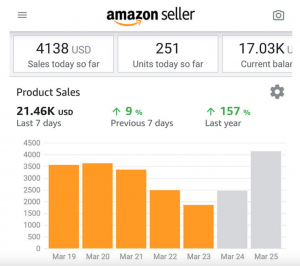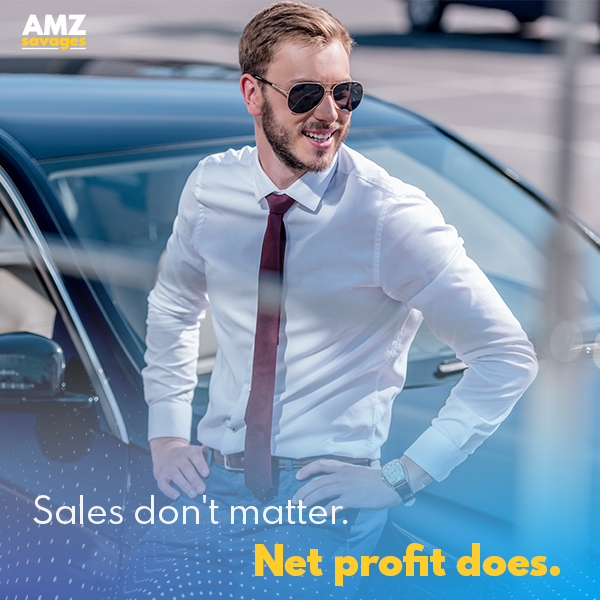Meet Justin.
He goes by “Amazon J” and posts images like this to solidify his credentials as a rising “guru” in the Amazon space.

Impressive, isn’t it? Impressive enough that you would probably turn to Amazon J for his expertise if you were a new seller right?
First off, Justin isn’t his name and we actually have no idea how this kid actually makes his money. But, this profile is typical of what curious Amazon sellers do come across when seeking mentorship with their entrepreneurial journey. Look, we get it. He’s got the cool car, the name, and most importantly, he’s got the sales numbers to back his proficiency.
And, as any savvy business person knows, numbers don’t lie. People lie, but metrics don’t. So, looking at an Amazon report like the one above elicits awe, maybe even jealousy.
Here’s the thing: None of these metrics mean ANYTHING if the person brandishing them isn’t including their net profits. Making claims that one’s success is contingent solely on their sales can be incredibly misleading. It’s not unsimiliar to telling someone you won third place in a race. That number is only meaningful or valuable when compared to the number of people you ran against. Being third place is very different if you’re competing against 100 runners as opposed to 5.
If sales or revenue is what you are focused on, then you are setting your business up for failure. This applies to any business – from traditional brick-and-mortar retailers to service providers to e-commerce retailers. When you consider your mark-up for a product, you need to factor in all costs associated with the making and the promoting of that unit.
Net Profit vs. Sales
Depending on the type of product your business is structured around, there are multiple areas of expenses to be mindful of. Let’s take for example brick-and-mortar businesses. Obviously, the first thing you need to consider is overhead – leasing, electric costs, labor costs, shipping, storage, etc. Your operating costs need to be factored into the price you position your product because your store won’t make enough to cover overhead AND make a profit.
E-commerce is no different. A lot of online sellers make the mistake of looking at the brick-and-mortar business structure and thinking “I can sell online and remove all my overhead.” Not true. While you may not have overhead like leasing, employees, and electricity, you still have overhead – it’s just structured differently.
Say you have a product and you want to sell on Amazon’s platform. More than likely you’ll look at the price range of your competitors, calculate your price of goods, manufacturing, and landing costs, and base your markup on those factors. Unfortunately, your COGS and landing costs are only part of the overhead and – if mismanaged – will make your product non-profitable.
If you plan on selling on Amazon (or already are), here are a few things you need to calculate into your “wholesale” costs.
Amazon Fees
Obviously, Amazon isn’t there to provide free real estate for your business. Nothing comes for free, people! When calculating the true value of ONE unit, you need to apply the Amazon fees associated with that one unit:
Individual Seller fee: $0.99 per unit
Professional Seller fee: $39.99 a month unlimited units
FBA, storage fees, shipping fees: (depends on weight, size, and category). Storage fees include monthly fees, long-term storage fees, and removal of order fees. These also can fluctuate during busy seasons like Q4.
Sales percentage fees (Referral fees): on average 8%-15% of the total price; includes the item price and gift wrapping.
Refund fees: Amazon will refund you the referral fee minus their administration fee, which is the lesser of $5.00 or 20% of the referral fee.
Photography and Listing Optimization
For the creative type, the prospect of creating amazing images and content for their product is a fun and sexy venture. Creating an entire aesthetic and voice around your brand is super important and is generally one of the processes sellers enjoy. However, it’s also an expense that absolutely needs to be factored into your pricing.
Sure, you can cut costs by hiring someone on Fiverr to do photoshop and infographics, but with the mounting competition on Amazon, high-quality images for your listing and social media marketing are incredibly important. Should you go the route of having lifestyle photography and videography taken, anticipate paying upwards of a few thousand dollars.
Software programs for keyword research and listing optimizations can be a fiscally conservative option when writing your detailed page, but they also require monthly subscriptions. Hiring a marketing agency to do your listing optimization can range anywhere from $200-$800 dollars.
Launching Fees
With Amazon continually refining and tightening their TOS on how to get reviews, launching has resorted to some serious maneuvering, tricky strategies, and even black hat tactics. Using launching services like Rankbell is very effective, but also quite costly. Using software programs like Elite Seller can also be incredibly impactful – but again – pricey. And let’s not forget about how much money you’ll lose on giveaways and discounts on your product.
Now, onto the reoccurring/continual fees you will accrue over the lifespan of your Amazon Business…
PPC Management and Spend
PPC fees depend on the level of management you wish to do yourself or have outsourced. Using the latest PPC software programs will cost a monthly subscription ranging anywhere from $200-$600. The average PPC management company charges roughly $300 per ASIN per month (and these costs don’t factor daily budget spend for your PPC).
Outside Advertisement
Lastly, you need to account for advertising costs outside of Amazon. Now, many sellers do just fine tailoring their ad spend solely on Amazon with no external traffic – and that’s great! But if you choose to run Facebook ads, Google ads, Instagram ads, or Tik Tok ads, you better be financially prepared for those accrued costs. It’s even more expensive when you hire someone else to do it for you.
Bottom Line
Financial success isn’t measured by how much your company makes; it’s measured by how much YOU make. It’s great to enjoy a thriving business, but if that business results in you breaking even (or worse, puts you in the hole), you need to rethink your strategy and look at your numbers from a different angle.
Whether you are on the journey to becoming an Amazon seller or you already have been selling for a while, it’s important to look at all of your costs going in and out and figure out a way to diminish overhead in order to elevate your net profit.


